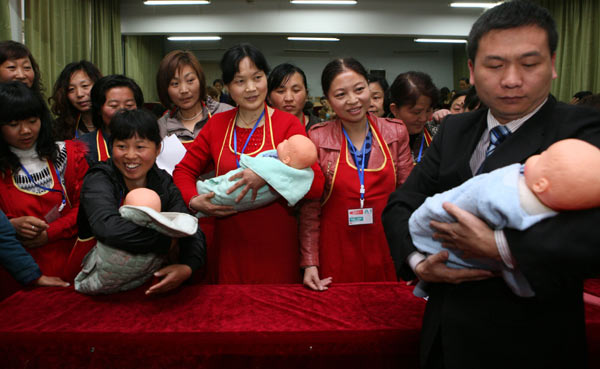Whys and wherefores of who looks after baby
Updated: 2012-05-03 07:32
By Wang Qingyun (China Daily)
|
||||||||
 |
|
An official from a nursery service from Shenzhen shows potential babysitters how to take care of a baby in Xiangyang, Hubei province. GONG BO / FOR CHINA DAILY
|
Zuoyuezi, or "recuperating in the first month after giving birth", is a tradition for Chinese women.
Mothers are recommended to have abundant rest, eat nutritious food, always keep warm and avoid strenuous work - so, enter the yuesao, who will care for both mother and baby.
But hiring a yuesao, or postnatal nurse, can cost more than 15,000 yuan ($2,400) a month in Beijing, and the quality of such nurses varies.
A typical service by a postnatal nurse includes helping the mother feed and bathe the baby, checking on the mother's and baby's health, cooking meals high in protein and mild in flavor, and giving massages to aid recovery and sufficient breast milk.
Arguably, new parents should learn to do these things for themselves, but many people prefer to pay professionals.
Wang Yuanyuan, 29, is one who opted for professional care.
"I think it's necessary to have a postnatal nurse," said Wang, who gave birth to her first baby in January. "She has taken care of many newborn babies and new mothers, so she knows how to deal with problems that I have never seen.
Wang hired a postnatal nurse for two months, paying her 12,000 yuan. Her mother also came to help. Wang was satisfied with her nurse's work, especially her attitude and her massages to induce breast milk.
A staff worker at Woaiwoqi, a provider of postnatal nursing services in Beijing, said it charges from 4,800 yuan to 15,800 yuan a month, depending on the nurse's experience and skills.
"Those who charge more than 10,000 yuan have taken care of many premature and twin babies, and are very proficient at their work."
The nurses from Woaiwoqi all hold a "certificate of mother and baby care", said the staff worker.
Two other postnatal nursing agencies in Beijing, Yuyingzhijia and Rongjiashi, which charge 3,800 to 12,800 yuan a month for postnatal services, also said their nurses were certified.
However, the certificates cited by the three companies were issued by three different organizations.
The Ministry of Human Resources and Social Security has not yet included "mother and baby nurse" in its occupational classifications, or set professional standards for the job, said a staff member in the occupational skills testing authority of the ministry.
Lack of a recognized professional standard allows postnatal nurse providers and training companies to train and test their own workers, and issue their own certificates.
"This business is very competitive," said a staff worker from the Rongjiashi agency. "I think the increase in postnatal nurses is even greater than in newborn babies. And good nurses are relatively rare."
New mother Wang Yuanyuan agreed. She began "searching everywhere" for a reliable postnatal nurse when she was pregnant.
"Good ones will already be contracted out, if you don't start looking for them early," Wang said, adding that high demand for their services gives them more say in how much to charge.
The high cost and difficulty of getting a postnatal nurse in Beijing has led new parents to seek other options.
A 27-year-old woman about to give birth, who wished only to be identified by her surname, Zhao, said she has booked a nurse from her hometown, in Northeast China's Liaoning province, to come to look after her and her baby in Beijing.
She said her parents found the nurse, who only asked for 5,700 yuan a month.
However, Su Suiqing, a doctor working at the National Center for Women and Children's Health at the Chinese Center for Disease Control and Prevention, said new mothers do not need to hire a yuesao.
"Doctors usually give new mothers advice on how to take care of their babies and themselves before they leave hospital," said Su.
"It is what they should be able to manage. What's more, mothers can strengthen the bond with their babies by taking care of them more."
wangqingyun@chinadaily.com.cn

 Relief reaches isolated village
Relief reaches isolated village
 Rainfall poses new threats to quake-hit region
Rainfall poses new threats to quake-hit region
 Funerals begin for Boston bombing victims
Funerals begin for Boston bombing victims
 Quake takeaway from China's Air Force
Quake takeaway from China's Air Force
 Obama celebrates young inventors at science fair
Obama celebrates young inventors at science fair
 Earth Day marked around the world
Earth Day marked around the world
 Volunteer team helping students find sense of normalcy
Volunteer team helping students find sense of normalcy
 Ethnic groups quick to join rescue efforts
Ethnic groups quick to join rescue efforts
Most Viewed
Editor's Picks

|

|

|

|

|

|
Today's Top News
Health new priority for quake zone
Xi meets US top military officer
Japan's boats driven out of Diaoyu
China mulls online shopping legislation
Bird flu death toll rises to 22
Putin appoints new ambassador to China
Japanese ships blocked from Diaoyu Islands
Inspired by Guan, more Chinese pick up golf
US Weekly

|

|






